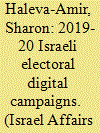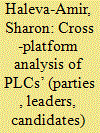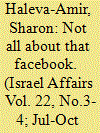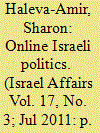|
|
|
Sort Order |
|
|
|
Items / Page
|
|
|
|
|
|
|
| Srl | Item |
| 1 |
ID:
187567


|
|
|
|
|
| Summary/Abstract |
This article focuses on the three Israeli digital campaigns during 2019–20 elections through their most prominent negative trends, namely: fake news, accounts and identities; politicians’ chat bots; influence and interruption networks, illegal information accumulation on Israeli citizens via social media and voting apps; anonymous and fake spam, and a complete lack of compliance with the statutory and regulatory framework. With technology’s speedy advancement, legal tools’ lagging, and political actors’ exploitation of the situation to their benefit, it seems that these campaigns, setting forth a fifth phase of political communication – Algorithmic Campaigns – constitute a rather bleak and grim future, as far as elections are concerned, thereby calling for rethinking.
|
|
|
|
|
|
|
|
|
|
|
|
|
|
|
|
| 2 |
ID:
180058


|
|
|
|
|
| Summary/Abstract |
This article analyzes social media presence of all parties, leaders, and candidates (PLCs) during Israel’s 2015 electoral campaign, within a transformational era for online campaigns. The article adheres to the theoretical frameworks of normalisation/equalisation hypotheses and personalised politics. Its research design is based on a cross-platform analysis. Findings indicate not only a centralised personalisation trend but rather a depersonalised web sphere. Leaders are more prominent online compared to other candidates; and parties out-perform their leaders, too. Furthermore, findings point to a normalised web sphere, even when referring to new and trendy platforms, revealing that the chances of political newcomers entering the parliamentary arena are scarce.
|
|
|
|
|
|
|
|
|
|
|
|
|
|
|
|
| 3 |
ID:
149191


|
|
|
|
|
| Summary/Abstract |
Only 26 months separate the elections for the 19th Knesset (January 2013) from those for the 20th (March 2015), yet the digital campaigns employed in the latter demonstrate interesting shifts. Using empirical data collected from social network sites and from journalistic campaign coverage, this article analyses the use of the online sphere by parties, candidates and audiences, identifying evolving shifts in digital campaigning. The findings point out the reoccurrence of some trends, whether intensified or otherwise, as well as the emergence of new trends that illustrate the evolution of Israeli online campaigning. The prominent recurring trends are (1) personal politics; (2) professionalized campaigns; (3) alternative funding models; (4) social activism; and (5) constant violation of election law provisions. The new trends include: (1) Facebook’s alternatives; and (2) assimilation of web culture into the campaigns. Analysing the findings suggests that current campaigns focus on entertainment rather than on real discourse and stress the obsolescence of the current legal regime
|
|
|
|
|
|
|
|
|
|
|
|
|
|
|
|
| 4 |
ID:
106312


|
|
|
|
|
| Publication |
2011.
|
| Summary/Abstract |
This article describes how Israeli parliamentarians, political parties and candidates, as well as audiences use the Internet. Utilizing empirical data, the article analyzes the use of online media by candidates and incumbents and reviews the diverse applications they employ.
|
|
|
|
|
|
|
|
|
|
|
|
|
|
|
|
|
|
|
|
|